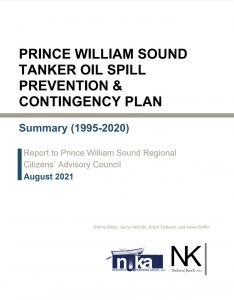What is a contingency plan?
A contingency plan, or “c-plan” is a document which contains instructions that outline steps to be taken before, during, and after an emergency.
An oil spill contingency plan contains detailed information on prevention and response activities in the event of an oil spill.
Preventing an oil spill from occurring in the first place is the most effective strategy to protecting human health and the environment. A contingency plan (technically an “oil discharge prevention and contingency plan”) includes information on measures taken to prevent a spill from occurring.
If an oil spill occurs, however, it is necessary that a systematic and well-organized approach be taken to quickly contain and control a spill. Responding efficiently and effectively to a spill requires that planning for a response be done ahead of time.
C-plans contain:
- information about emergency actions and notifications that must be taken in the event of a spill
- comprehensive explanations of response organization and chain-of-command structures
- detailed information about the facility or tank vessel.
Each plan must also contain information that demonstrates that enough equipment and personnel are available to respond to a spill of a designated size, and that the oil industry considers the best technology available for oil spill response.

In 2021, the Council worked with Nuka Research to develop a history of the changes made to the tanker contingency plan between 1995 to 2020. Find out more and read the report.
Owners and operators of facilities or tank vessels are required to submit their c-plans to regulating agencies for approval. The agencies review the c-plan, and if it meets applicable laws and regulations, the plan gets approved. A tank vessel or oil facility cannot operate without an approved c-plan. These plans are renewed at fixed time intervals or when there is a change in operations.
The Council’s Role in Contingency Planning
As mandated by the Oil Pollution Act of 1990 and our contract with Alyeska Pipeline Service Company, one of the Council’s prime responsibilities is to review oil spill contingency plans in light of changing circumstances and new technological developments. This role is an important way to combat potential industry and government complacency because it involves local citizens in the process. Only when local citizens are involved in the process will the trust develop that is necessary to proceed from confrontation to consensus.
The Council monitors and comments on state and federal contingency plans for the Valdez Marine Terminal (VMT) and associated oil tankers, as well as the Alaska Federal/State Preparedness Plan (Unified Plan) and associated Subarea Plans.
C-plan Renewal Process
By state and/or federal regulations, industry C-plans must be renewed on a scheduled basis, typically every five years. The renewal phase provides the public and the Council an opportunity to voice concerns and propose revisions for improvements to the plan. C-plans also undergo revisions if there is a significant change in operations.
Contingency planning is a process that accounts for preparations to limit damage caused by a spill. The plan describes the entire response system. Through this process, the system is tested and modified based on what is learned through that testing.
This cycle ensures that preparations for responding to oil spills will always be improving.
Some c-plans are prepared by federal, state or local governments so that these entities are prepared to respond. Other c-plans are prepared by owners or operators of oil tankers or facilities. Industry c-plans are required by both federal and state laws.
Differences Between Federal And State Contingency Plans
Oil Spill Contingency Plans Fact Sheet – Updated January 2013
Comments on Recent Contingency Plan Renewals
The Council reviews all contingency plans related to Prince William Sound and provides comments. The table below is a list of letters containing comments on recent renewals. This is not a comprehensive list. Please contact us if you would like to view previous archived documents on contingency plans.
| Document Title | Date | View Document |
|---|---|---|
| PWSRCAC comments on 2024 VMT Contingency Plan Renewal | December 15, 2023 | |
| PWSRCAC’s Comments on Tanker Contingency Plan – 2023 | October 20, 2023 |